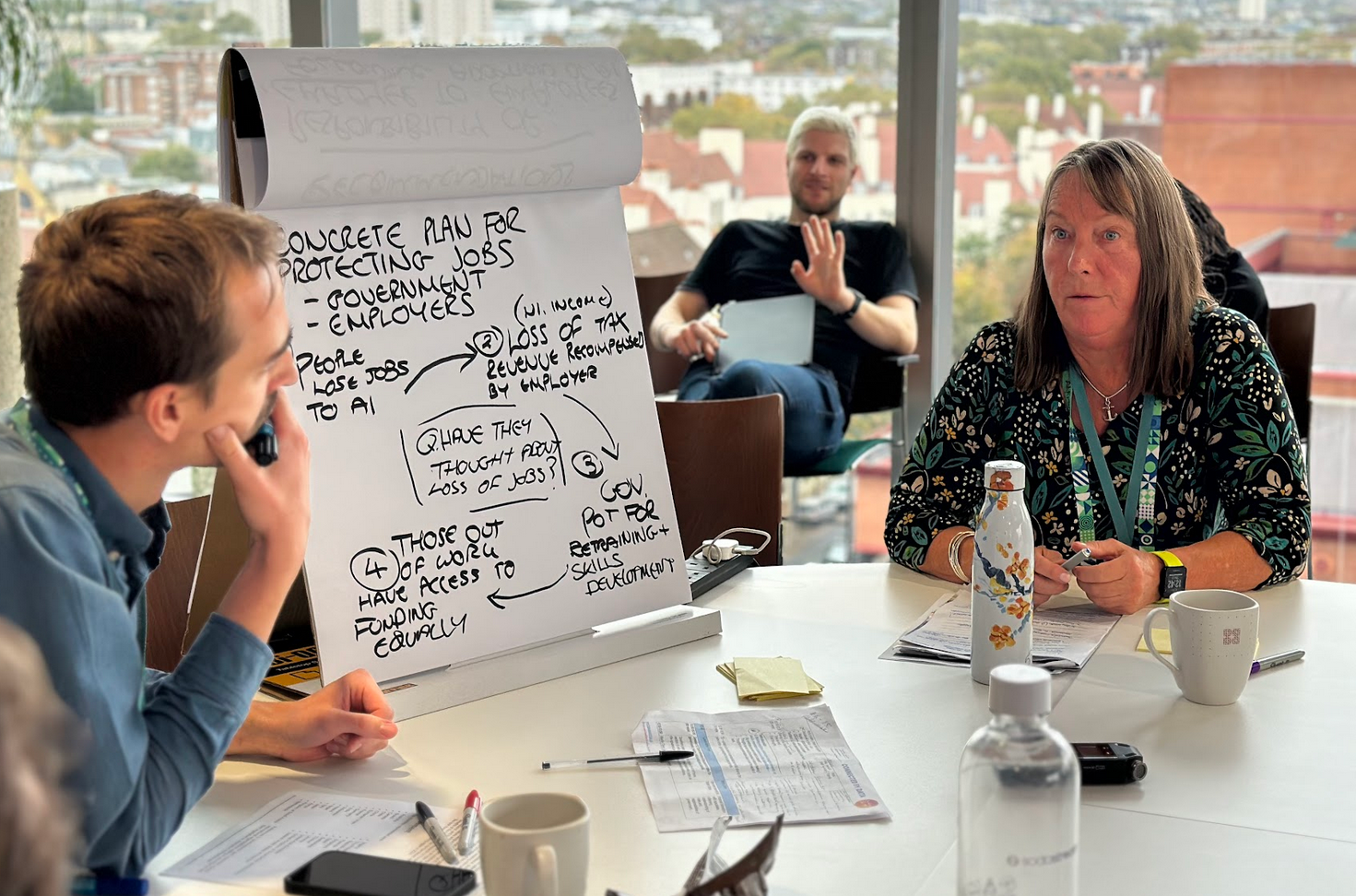People's Panel on AI Bulletin 4
This is the fourth bulletin from the People’s Panel on AI, sharing observations and insights from Connected by Data as an observer. You can find earlier bulletins here.
Today, the panel focus turned from exploring AI, to thinking about the ways industry, academia, government and civil society can respond.

Image: Members of the People’s Panel deliberating and listening to an expert panel on 2 November 2023
We started the day at the Fringe, listening to sessions on AI and the Future of Work, before heading over to the Digital Catapult for a deliberation session: including watching the livestream recordings from the AI Safety Summit’s closing plenary yesterday, where working groups reported their conclusions.
Then it was back to the British Library for a dedicated discussion between the People’s Panel, and a panel of experts (Katie Arthur (DSIT), Martin Tisne (Luminate Strategic Initiatives), Jack Stilgoe (Responsible AI UK), and Abigail Gilbert (Institute on the Future of Work) on the role that different stakeholders should play in AI governance.
Finally, we attended a Fringe panel on safeguarding democratic institutions and processes, including inputs from Ed Vaizey (House of Lords), Andy Parsons (Adobe), Seyi Akiwowo (Glitch), Gabriela Ramos (UNESCO) and Marietje Schaake (Stanford University), who yesterday at the Summit highlighted calls to embed random selection citizen participation in AI advisory bodies and institutions.
We hope that the experiment of the People’s Panel itself offers a demonstration that public deliberation can operate in agile ways, with no necessary mismatch between the speed of public engagement and the pace of technical development.
The People’s Panel project came together over just six weeks, and after just six or so hours of discussion of AI, participants were able to offer informed views and opinions into AI governance debates.
“This highly ambitious project has been really pushing the boundaries of public deliberation. The team and Panel have brought the energy and enthusiasm, flexibility and adaptability to make it work. It’s been an exciting project to watch and I’m keen to see how the team draw everything together tomorrow” - Independent evaluator of the People Panel.

Image: Exploring responses to the employment impacts of AI
Postcard from the Future
In backing the People’s Panel, our anchor funder, Mozilla said “AI’s journey will undoubtedly be tumultuous. But its direction should be influenced by the public. We need a democratised dialogue where civil society sits at the table, ensuring AI’s growth mirrors our shared values.”
To think about values and priorities that could guide AI development, the panel ended discussions today by writing a ‘postcard from the future’, thinking about what the world might look like in 2028 if AI is going well:
- Because of good education about AI, the future is not frightening;
- Because of effective use of AI, there is access to bespoke education and individualised learning;
- The use of AI in transport delivers automation, reduced costs, more opportunities, greater choice, and the option of automated cars;
- Health benefits are seen through cancer research, assisting staff with their day-to-day work, more efficient health service (e.g. automated prescriptions) and signposting to remedies;
- AI supports farming and food production through crop rotation that maximises yields and achieves food security, and that drives reduction in global hunger;
- Affordable housing is enabled by AI that analyses land use and supports better inheritance policies;
- There is safeguarding for all with AI that picks up harmful content and provides protection from harmful sites, and legislation that has serious consequences if broken;
- Work life balance is better through AI that lets us work smarter, not harder. Resilience that ensures those whose jobs are displaced are not forgotten.
- AI is delivering life that is less screen based and is giving people with limited mobility some autonomy back.
As we heard from speakers at the AI Fringe today, it can be far easier right now to raise funds for an AI startup that solves the problems of wealthy men, than it is to access funds for more inclusive AI development, or for using AI in applications that meet grassroots needs. What will it take for this to change?
What’s next?
On Friday we’ll be bringing together all the threads the People’s Panel on AI have explored this week: from thinking about everyday AI applications, to reviewing AI Safety Summit outputs. Over the morning, the panel will deliberate and develop recommendations, and then at 13:30 we will present findings.
Look out for a bulletin tomorrow with the panel’s initial report - and an invitation for you to respond with what the findings might mean for you.
